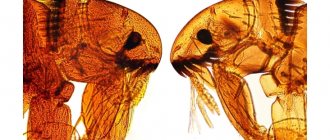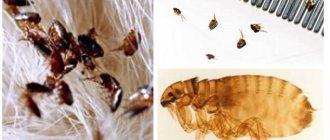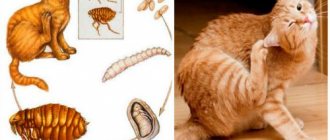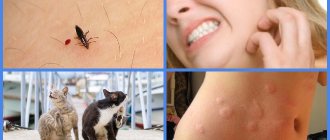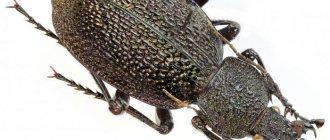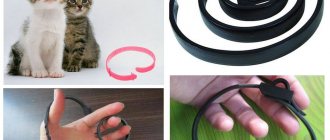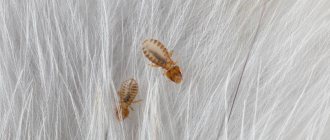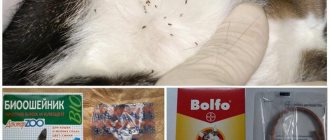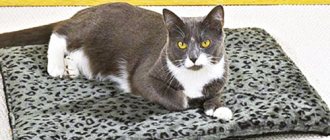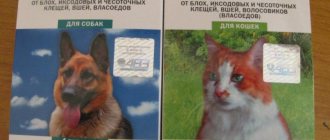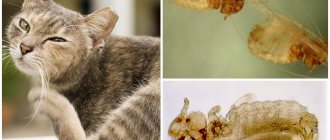Why do cats hunt insects?
Cats love to chase insects.
This is due to the fact that pets exhibit an innate hunter instinct. Even if an animal lives a domestic life and eats well, it does not miss the chance to have a race with insects. It is impossible to call your pet while hunting. He does not respond to his favorite toys or screaming. This applies to even the laziest cats.
Important: if a cat catches a fly, it will definitely eat it. Thus, the pet demonstrates its strength, agility and hunting skills.
Many pet owners get scared when their pet eats a pest. Before you run to the vet, you need to understand what the danger is and whether the problem can be eliminated on your own.
The dangers of your pet eating flies
A cat that swallows a fly may suffer from:
- Insect bite. This applies primarily to horseflies and gadflies. The insect can sting a pet in the tongue or larynx.
- Helminth infections. Flies are carriers of germs and worms. Once in a favorable environment, they begin to actively develop, thereby causing harm to health.
Important: in case of a bite, swelling of the larynx is possible. Without timely assistance, the pet will suffocate.
A housefly is not capable of biting a cat when he is hunting for it, but a gadfly or a live fly can do this.
There are also indirect dangers associated with the process of hunting insects, namely:
- the cat is capable of falling out of a window or balcony;
- an animal may break a vase and then injure itself on the fragments.
To avoid problems, it is best to remove breakable items and close windows.
General clinical picture
Unfortunately, as such, the overall clinical picture is either absent or very blurred. This is due to the incredible variety of potential toxins and poisons, the clinical manifestations of poisoning with which also vary significantly. Since many toxins enter the animal’s body through food, responses from the gastrointestinal tract (vomiting and diarrhea) are typical. The problem is that the first signs of neurological pathologies often develop (tremor, wooden gait, seizures, excitability, depression or coma). All of them are characteristic of many viral and parasitic diseases, and therefore it can be extremely difficult to suspect poisoning in time.
Possible manifestations of damage to the respiratory system (coughing, sneezing, difficulty breathing). When toxins penetrate through the skin, a response develops in the form of inflammation and swelling of the skin. They can easily be confused with symptoms of allergic reactions. The development of liver failure (jaundice, severe vomiting) and/or kidney failure (sharp increase in thirst, lack of appetite and weight loss) is very typical. Considering that the effect of many toxins is complex, all the symptoms described above can be combined and very blurred, which makes diagnosis extremely difficult.
It is important to remember that even stopping all signs of acute intoxication by administering an antidote (if it exists at all) does not guarantee a complete recovery of the affected animal. Moreover, in some poisonings, the liver and kidneys are irreversibly damaged (for example, due to improper treatment with antibiotics), which dooms the animal to constant treatment throughout its entire life. Let us also note that if the nervous system is damaged (which also happens quite often), the cat will almost inevitably develop various neurological disorders in the future, including seizures (reminiscent of epileptic attacks).
What danger awaits
A cat hunts a fly In itself, the fact that a cat catches and eats flies is completely safe. There is nothing in the body of insects that the body of a cat cannot digest. Even the dirt carried by the flies is not dangerous.
But this kitten’s hobby cannot be left without due attention. During the chase, the cat may be so carried away that he will not notice how the fly flies out through an open window or balcony. This is quite normal for a flying insect, but a pet can be seriously injured. This is especially true for residents of the upper floors. To prevent this from happening, there should always be reliable mosquito nets on the windows. They will save you from flies and prevent the animal from flying away.
Important!
Flies are carriers of helminth eggs. And if the cat swallows them, then there is a chance of infection. Therefore, veterinarians advise all owners of domestic cats to take preventive measures to combat worms. This should be done even by those who do not walk around and live in an apartment permanently. The difference between street and indoor cats is the frequency of worming. For domestic cats, it is enough to give an anthelmintic drug once every six months, for street cats every 2-3 months.
During the hunt, cats become simply uncontrollable, so they can easily break their favorite vase or scratch expensive furniture. Very often curtains or drapes suffer.
It will be unpleasant if the cat decides to catch a wasp, bee or bumblebee. It can sting an animal, and the consequences depend on the degree of endurance of the body. Some pets cope with swelling of the bite site, while others begin vomiting, diarrhea, and may foam at the mouth. The most dangerous bite is to the palate or larynx. It will cause swelling and the animal may well suffocate. If a dog or cat is bitten by a bee, immediate help will be required in the form of antihistamines.
Thus, a cat eating flies is a completely normal and natural phenomenon. The animal is just having fun. The pet owner’s task is to ensure the safety of his pet, and in the event of a fly or stinging insect bite, to monitor the body’s reaction.
Cats, regardless of their age, are playful. They try to catch everything that moves. Flies were no exception. Seeing a low-flying or crawling insect, pets attack it. In most cases, they eat the pest. The question arises, how harmful is this and what to do if a similar situation occurs? We will try to get answers within the framework of this article.
What should the owner do?
The prepared saline solution is necessary so that the animal can vomit the swallowed object.
When the owner catches the pet eating threads, it is important not to hesitate. First of all, you will need to take the cat in such a way that it cannot resist and scratch the person
Then the pet needs to open its mouth and carefully remove the thread if it remains on the tongue. However, the owner may not have time. If the cat has already swallowed a foreign object and no serious deterioration in its condition has been noticed, it is permissible to provide first aid at home. When a pet ate a thread not long ago, the first thing the owner needs to do is try to provoke vomiting. Veterinarians recommend preparing a saline solution. To do this, you will need to add 2 teaspoons of salt to 1 liter of purified water and mix thoroughly. The resulting composition must be poured into the cat’s mouth and wait until he vomits.
If the pet ate threads a few hours ago, they should have already reached the intestines. In such a situation, you should use a syringe without a needle and Vaseline oil. A product is carefully poured into the animal’s oral cavity, which helps facilitate the passage of threads through the gastrointestinal tract. After the manipulation, veterinarians recommend not giving the cat food for 2-3 hours. In addition, the owner needs to make sure that the pet goes to the toilet. When threads begin to come out of the anus, the owner is strictly forbidden to try to pull them out
This precaution is due to the fact that the possibility of damage to internal organs cannot be excluded.
After such an emergency, the pet may become apathetic, which indicates the need for medical attention.
A pet that has swallowed thread does not always feel well. The following symptoms may be noticed:
- apathy;
- weakness;
- vomit;
- anxiety.
In such a situation, it is important for the owner to take the cat to a veterinary clinic as soon as possible. The veterinarian will examine the animal and will be able to remove the thread using an endoscope if it is located in the stomach
In a situation where a foreign object has reached the intestine, causing its obstruction, surgical intervention is preferably prescribed. Veterinarians note that most cats tolerate such operations well.
Can cats eat flies and what are the benefits?
Cat and fly If a cat eats flies, then, first of all, he trains his hunting skills. This is a call of nature and a kind of training. In addition, a live target causes much more excitement in a cat than bells or rubber mice purchased in specialized stores.
For cats, movement is a necessary and vital element of life. Only a brave and trained predator can survive in the wild. Pets have no choice but to hone their skills on flies, flies and other insects.
In nature, a cat is a representative of the most advanced predators. At home, caring owners surround their pets with excessive love, feed them with special food and suppress their natural skills. Regular exercise helps cats stay in good shape.
On a note!
It is also important to remember that flies are a valuable source of protein and chitin, which your pet needs for the health and growth of claws, teeth and fur. And chitinous components serve as the basis of the top cover. The cat will not be able to completely meet its daily requirement by eating flies, but a small part will still be absorbed.
Benefits of eating flies
Strange as it may sound, catching and eating flies brings some benefits to the cat. First of all, the pet trains its hunting skills. It is more interesting to play with a living “target” than with soft toys.
Exercise keeps cats in good shape. This affects their health and mood. At home, some owners feed their pets, thereby inhibiting their natural skills.
As for eating insects, this also has some benefits. The animal receives:
- protein;
- chitin.
Of course, it will not be possible to completely replenish the reserves of these substances, but some of them are quite possible.
Important: to prevent cats from eating insects, in addition to food, give them vitamins. In general, cats eating flies does not cause serious harm to health. If, nevertheless, the pet ate a pest, inspect it for signs of bites.
If necessary, consult a specialist. The main thing is not to panic. Remain calm and nothing serious will happen to the animal.
If, however, your pet ate a pest, inspect it for bite marks. If necessary, consult a specialist. The main thing is not to panic. Remain calm and nothing serious will happen to the animal.
In general, cats eating flies does not cause serious harm to health. If, however, your pet ate a pest, inspect it for bite marks. If necessary, consult a specialist. The main thing is not to panic. Remain calm and nothing serious will happen to the animal.
According to felinologists, a cat eats flies because this is justified by its hunting instincts. Pet owners should not worry, because midges contain nutrients that are beneficial for the cat’s diet. However, there is a minimal risk of contracting parasites, so your pet needs to be regularly vaccinated and dewormed for preventive purposes.
The cat swallowed a fly: danger and first aid
Cats, regardless of their age, are playful. They try to catch everything that moves. Flies were no exception. Seeing a low-flying or crawling insect, pets attack it. In most cases, they eat the pest. The question arises, how harmful is this and what to do if a similar situation occurs? We will try to get answers within the framework of this article.
Cats love to chase insects. This is due to the fact that pets exhibit an innate hunter instinct. Even if an animal lives a domestic life and eats well, it does not miss the chance to have a race with insects.
It is impossible to call your pet while hunting. He does not respond to his favorite toys or screaming. This applies to even the laziest cats.
Many pet owners get scared when their pet eats a pest. Before you run to the vet, you need to understand what the danger is and whether the problem can be eliminated on your own.
A cat that swallows a fly may suffer from:
- Insect bite. This applies primarily to horseflies and gadflies. The insect can sting a pet in the tongue or larynx.
- Helminth infections. Flies are carriers of germs and worms. Once in a favorable environment, they begin to actively develop, thereby causing harm to health.
Important: in case of a bite, swelling of the larynx is possible. Without timely assistance, the pet will suffocate.
A housefly is not capable of biting a cat when he is hunting for it, but a gadfly or a live fly can do this.
There are also indirect dangers associated with the process of hunting insects, namely:
- the cat is capable of falling out of a window or balcony;
- an animal may break a vase and then injure itself on the fragments.
To avoid problems, it is best to remove breakable items and close windows.
If a pet has swallowed an insect, it is necessary to immediately examine it, as there is a possibility of a bite. Otherwise, the animal may die.
The inspection must be done carefully. If a bite mark is noticed in the oral cavity, it is recommended to immediately go to the veterinarian. To alleviate your pet's condition, administer antiallergic medications:
- Prednisolone;
- Dexamethasone.
Important: Call your veterinarian before administering the drug. A specialist will help you calculate the dosage.
Most often, 0.06 ml of medication is administered per kilogram of live weight.
If the bite was made near the muzzle, that is, not in the oral cavity, it is necessary to treat the wound. This is done with a soda solution. Add 10 mg of soda to half a liter of water. To avoid an allergic reaction, feed your pet ¼ Tavegil tablet.
When the danger of edema has been eliminated, it is better to deworm the cat. This is only done if the procedure has not been performed before.
It is impossible to prevent a cat from catching flies, so it is best to prevent their appearance and spread in the house. This can be done using:
- Sticky tapes. Such “traps” will reduce the number of insects in the apartment, thereby preventing the pet from catching them.
- Fumigators. The device repels pests, preventing them from entering the room.
- Folk methods. It is best to place basil or cloves throughout the rooms. Thanks to the aroma of plants, flies will leave the apartment.
To avoid the appearance of helminths, pets need to be vaccinated 2 times a year. You should also periodically show the animal to the veterinarian, even if it is healthy.
Strange as it may sound, catching and eating flies brings some benefits to the cat. First of all, the pet trains its hunting skills. It is more interesting to play with a living “target” than with soft toys.
Exercise keeps cats in good shape. This affects their health and mood. At home, some owners feed their pets, thereby inhibiting their natural skills.
Important: to prevent cats from eating insects, in addition to food, give them vitamins.
What to do if the cat ate...
The cat is considered one of the most careful animals that does not eat anything that can harm it. However, every owner should know what to do if a cat is poisoned, because there are different situations in life.
Often the person himself helps with this, trying for his pet, not suspecting that he can harm the animal in this way. As an example, we can take those situations when the owner of a cat tries to choose the most powerful flea remedies.
And when a cat is poisoned by flea drops, what to do in this situation worries every loving owner. The thing is that these animals are incredibly clean and try to immediately wash off harmful substances from themselves, even if they were applied in order to get rid of parasites.
When it comes to food, cats are very careful. Many consider them to be picky, but in reality they simply do not eat anything that does not benefit their body. But cats love birds and mice, as they are an excellent source of calcium and other nutrients.
But mice, and even more so rats, can be very dangerous to the health of a four-legged hunter. If they were poisoned, the cat could suffer severe damage, even death.
A cat can become poisoned by licking harmful substances off itself.
The hardest thing is for kittens, as they are particularly curious and can test on themselves some products that are undesirable to put into their stomachs. For example, a small kitten can steal an old slice of cheese or stale sausage from a trash can. An adult animal can also take such a desperate step only if it is very hungry.
Those cats that live in apartments often suffer from boredom and loneliness. Of course, a cat can meditate for a long time, looking at the wall, or simply enjoy the view outside the window, lying on the windowsill, but attacks of excessive activity also occur. During such periods, the animal may begin to play in the bathroom, where it scatters washing powders and cleaning liquids.
All this can get on its paws, and the result will be that the cat will simply lick off the harmful substances and become poisoned. Animal owners often turn to veterinary services with just such a problem. Therefore, it is necessary to carefully hide from your pet all substances and objects harmful to it.
Correct actions at the stage of first aid will save the cat’s life
Separately, it is necessary to say about those cats that live in private houses and have free access to the street. It will be especially difficult for them if they are poisoned. The thing is that when animals are very sick they try to get away from home.
Cats that have this opportunity will not die at home. Therefore, when the animal feels unwell, it will leave and the owner will not be able to help it.
It’s easier with pets, since here a person can quickly react and help his pet.
It is also necessary to take into account that in many cats the signs of poisoning can be very similar to the manifestations of rabies. This is both strange behavior and foaming at the mouth.
Therefore, the owner needs to be careful when it comes to an animal without vaccinations and with free access to the street.
Sometimes it can be difficult to find a veterinary hospital to examine an injured pet, so the owner must act independently. In any case, a person has the opportunity to help a cat. Correct actions at the stage of first aid will save the animal’s life. For mild to moderate poisoning, this may be sufficient.
In case of poisoning, you should contact a veterinarian as soon as possible.
If an animal has been poisoned by a drug or anti-flea product, it will have a characteristic state of overexcitation or excessive drowsiness.
After about a couple of hours, profuse salivation will begin, the pupils will be greatly dilated, and the gait will be uneven. It is possible that the animal will begin to vomit.
Some cats begin to act as if they have a bone stuck in their throat.
As for what to do if a cat is poisoned, there should be one action - the urgent administration of an absorbent. It is difficult to give an animal a pill when saliva flows continuously from its mouth and its swallowing reflex is impaired.
Here you can take activated carbon in the amount of 1 tablet per 1 kg of animal weight, crush it into powder and mix with a piece of your favorite food, for example, pate. Despite the fact that an animal will feel unwell if it is poisoned with medicine, the cat is unlikely to refuse its favorite treat.
In case of poisoning, you should take Polysorb, dilute it with water and give it to your pet.
It should be noted that a cat can exhibit similar behavior when poisoned with dichlorvos. If the house is being treated for insects, the animal must not be allowed to appear there. If a cat is poisoned by dichlorvos, what to do becomes the question that worries the owner. In this case, it is necessary to give the cat an absorbent.
Acids and alkalis
This will affect the fact that the cat, even if it really wants to, will simply not be able to drink water or eat. Additionally, there will be increased salivation and shortness of breath will be noticeable.
Here, as for what to do if a cat is poisoned, it is necessary to cleanse the animal’s larynx and stomach of acid, which alkali helps with. That is, you need to try to pour a soda solution into the animal’s mouth. This must be done very carefully so as not to induce vomiting.
If we talk about what to do if a cat is poisoned by alkali, which is present in large quantities in detergents, on the contrary, you should immediately try to induce vomiting in order to cleanse the stomach. Poisoning manifests itself as difficulty breathing, bloody stool and convulsions. Here you will need to balance the acidity of the stomach with acid, preferably lemon juice.
First of all, these are plants. Cats love to nibble on grass and mostly choose healthy options that saturate their bodies with the necessary substances, vitamins and microelements. But cats also make mistakes, so it is possible that the animal will simply eat grass that is poisonous to it.
This type of poisoning is always accompanied by increased heartbeat with signs of arrhythmia. The pulse becomes rapid, the pupils become very constricted or dilated, diarrhea and trembling in the limbs occur. This requires urgent rinsing. Enterosgel helps well for this, but a regular solution of potassium permanganate will do.
A cat can be poisoned by poisonous grass
This can be done by injecting a saline solution or a small amount of hydrogen peroxide.
If a cat often goes outside to hunt, then it is possible that one day he will attack a mouse or rat that has been poisoned with one of the special poisons.
If this drug immediately causes death in a rodent, then a larger animal, for example, a cat, may get away with poisoning.
But in fact, a lot depends on how a person will act in such a situation, as well as on the animal’s immunity.
A cat can attack a mouse that has been poisoned with one of the special poisons
If a cat inadvertently eats such a mouse, the poison will begin to act in his body. But, given that cats are not the smallest animals, their symptoms will develop slowly.
Zookoumarins can manifest themselves in a cat’s body for up to 10 days. Moreover, one of the most dangerous signs of such poisoning is hemorrhage.
It may be internal and not show itself, that is, the cat will slowly die, and the person will not even understand what is happening to him.
If a cat is poisoned by rat poison, the temperature rises
As for what to do if a cat is poisoned by rat poison, a person in this case can only provide first aid, that is, give the animal an absorbent and try to rinse the stomach.
It is especially dangerous when poisoning occurs in pregnant cats and small kittens; for them, even a slight ingestion of harmful substances into the body can cause death.
Therefore, if a small kitten appears in the house, or a domestic cat is waiting for a new addition, you must try to create all the conditions for them in order to avoid poisoning and tragedy in the house.
This will create a film on the walls of the stomach, which will prevent the poison from quickly being absorbed into the blood. With the right approach and timely human actions, an animal has a chance to survive even if poisoned by a strong toxic substance.
If a pregnant cat is poisoned, Enterosgel will help
You should not give your cat special medications at home. Only a veterinarian should administer special medications.
Probably, many cat owners have experienced how in the summer a cat, which just recently was dozing peacefully on the windowsill, suddenly suddenly shudders and begins to catch someone. And almost always this prey that deprives the cat of peace is a fly.
Of course, sometimes cats hunt on windows and for moths (but this usually happens in the evening), bees and wasps. A meeting with the latter, by the way, is very undesirable, since it is impossible to predict what the cat’s reaction to bee or wasp venom will be, unless the cat’s owner has carried out special preliminary tests or has already encountered a bee attack on his pet.
Why do cats catch flies?
But even if your cat's reaction to bee stings is normal, a bee sting can still be dangerous. Its danger lies not so much in it as in the cat's hunting instincts, which force it to take prey into its mouth. If a bee stings a cat on the roof of the mouth or throat, the animal's larynx may swell so much that the cat suffocates. In this case, the cat should be taken to the veterinarian as quickly as possible. Actually, this should be done immediately after the bite is noticed, without waiting for the cat to have difficulty breathing.
As for flies, which cats usually hunt for on windows, in most cases the cat behaves in a standard way - it immediately rushes to catch the fly. At the same time, the animal can perform the most unimaginable somersaults and jumps, crashing into furniture and knocking down flower pots during the chase - after all, the hunt that began on the window often ends in a completely different place, “moving” from the window to the entire space of the home. There are practically no cats that would be indifferent to flies. But why do they catch them?
Catching flies is a manifestation of the hunting instinct.
The answer to this question is quite simple. It is based on the results of evolution, which over several million years have made their cats almost the most perfect predator that nature has ever known. However, the highest status of the cat as a predator can be disputed, but no one will dispute the fact that representatives of the cat family are perhaps the most effective predators among all land mammals. Just think: domestic cats have been living with people for several thousand years. It would seem like a lot. But what does a few thousand years of domestic life mean next to millions of years? And these millennia cannot be called entirely domestic. After all, cats have relatively recently become sofa favorites, which are fed with various foods and dust particles are blown away from them.
If your pet is a couch potato, this does not mean that it has lost its hunting abilities and instincts.
For most of this “domestic” lifestyle, they were engaged in catching various rodents in barns and storage facilities, that is, they led the same hunting lifestyle, only in the territory developed by man. If we add to this the fact that during this period the blood of domestic cats was regularly mixed with the blood of wild cats, which inhabited the forests of Europe and Asia in abundance, then it becomes clear that domestic cats, despite all their “domestication” to this day remain pronounced predators. And no matter how much you feed these predators, they still won’t miss the chance to chase birds, mice or insects, and indeed anything that moves and that a furry hunter can catch. For the same reason, even a very well-fed cat loves playing with various balls or bows on a string - this is how cats realize their hunting instincts.
The cat watches the fly.
In addition, at home there are very few entertainments that could provide a cat with the physical activity it needs, so missing out on a fly is simply a sin for a cat - after all, this is a real cat attraction! This, by the way, is an important factor. Domestic cats, unlike humans, have fairly developed instincts that push the animal to, so to speak, a healthy lifestyle. In any case, the cat’s instincts in this regard, although they misfire, generally work better than those of humans, with the exception of rare representatives of both species. And these instincts tell the cat that it simply needs to move, even if there is no need for it. Therefore, if a cat living in its natural habitat can still ignore the flight of an insect due to a sufficient amount of movement, then a domestic cat most likely will not miss this opportunity.
In conditions of insufficient implementation of the hunting instinct at home, the cat’s reaction to a moving object can become aggravated. This is one of the characteristic features of hunting behavior. Unfortunately, for a fly that is trying to escape, its movement only aggravates the situation and adds excitement to the cat.
Catching flies and chasing them is excitement for a cat.
It should be noted that if a cat living in natural conditions does not have any decent prey, then it can “kill its appetite” by eating insects. Due to this instinct, a domestic cat that catches a fly will definitely eat it. The composition of insects is mainly quinine and protein. In view of this, there is no need to worry about the cat - both of these substances are very useful for fur and claws.
True, there is still some danger in eating flies. Not the same, of course, as if a cat swallows a bee, but still there. This danger is helminths, and in order to protect the cat from these parasites, it simply needs to be wormed periodically. Another danger is the cat's overindulgence in pursuit. In the heat of the moment, it can easily fall out of the window, which should be equipped with nets, or even better, bars ahead of time. You should also be aware that in pursuit of a fly, the cat may jump onto the stove when it is on.
If you find an error, please select a piece of text and press Ctrl+Enter.
According to felinologists, a cat eats flies because this is justified by its hunting instincts. Pet owners should not worry, because midges contain nutrients that are beneficial for the cat’s diet. However, there is a minimal risk of contracting parasites, so your pet needs to be regularly vaccinated and dewormed for preventive purposes.
What could be the consequences?
Eating flies in itself is not harmful to cats. Moreover, the animal is not able to eat a large number of insects in order to fill its stomach with chitin. But the danger still exists and it lies not in the flies themselves, but in the process of catching insects.
Cats are unusually concentrated during a hunt and do not notice dangers. Thus, cats living in apartments and catching flies while sitting on the balcony run the risk of falling out onto the street and getting seriously injured. Additionally, your cat may not be able to tell the difference between a fly and another flying insect, such as a bee or wasp.
During the hunt, a pet may be bitten by a stinging insect and the consequences can be very different. If a bee bites a cat before it enters the oral cavity, the animal may end up with a slight swelling in the area of the injury. If a poisonous insect stings a cat on the palate or tongue, an allergic reaction called anaphylactic shock may occur, leading to the death of the pet.
The owner’s task is to closely monitor his pet, trying to protect the home as much as possible from the penetration of various insects. Thereby protecting your pet from possible falls from balconies, injuries or bites of poisonous insects.
Cat owners whose pets persistently continue to hunt for flying animals are advised to purchase mosquito nets for their windows. Thereby preventing flies or other flying insects from entering the living space.
How to prevent misfortune?
As long as rodents live near people, they will be poisoned from time to time, which means that the likelihood of poisoning your beloved pet will exist. To protect your tailed pet from danger, it is recommended:
- Reliably seal all ventilation and sewer passages in the housing. This measure will prevent mice from entering during deratization.
- When planning to poison rodents in the house, take care in advance to ensure that the cat does not reach the poison and the pests poisoned by it.
- During the walk, make sure that your pet does not pick up anything from the ground. It is recommended to walk him on a harness.
- Let the animal go outside only after a hearty lunch, so that it does not have the desire to eat.
Care, maintenance and treatment of your pet
7 reasons to change your cat's food
It is not recommended to regularly change food or products in the diet without reason when eating natural food,…
5 first symptoms of calicivirus in cats
A number of other infections also cause problems in the respiratory system, but one of the most commonly diagnosed...
Osteoporosis in cats
Osteoporosis, when diagnosed early, is treatable. Therefore, it is very important to know the reasons...
Prevention of dental diseases in cats
Dental problems occur quite often in cats and provoke disorders throughout the body.…
Causes of obesity in cats
Obese animals are more likely to suffer from cardiovascular pathologies, endocrine disorders...
4 signs of ear mites in a cat
You need to recognize the disease immediately in order to consult a doctor in a timely manner and undergo appropriate…
5 main signs of panleukopenia in cats
Panleukopenia is a highly contagious disease that often occurs in an acute form.…
Pedigree of the cat
The pedigree contains all the necessary data that allows the animal to participate in exhibitions,…
Veterinary Directory of Animal Diseases For animal owners
- Diseases and treatment of cats
- Cat breeds
- Sterilization of cats
- Castration of cats
- Cat at home
- Cat vaccination
- Treatment of cats for fleas, worms and ticks
- Feeding the cat
- Kittens
- Cat health diagnostic service
5 first symptoms of calicivirus in cats
A number of other infections also cause problems in the respiratory system, but one of the most commonly diagnosed...
Prevention of dental diseases in cats
Dental problems occur quite often in cats and provoke disorders throughout the body.…
Causes of obesity in cats
Obese animals are more likely to suffer from cardiovascular pathologies, endocrine disorders...
4 signs of ear mites in a cat
You need to recognize the disease immediately in order to consult a doctor in a timely manner and undergo appropriate…
How to protect an animal
It is impossible to prevent a cat from catching flies, so it is best to prevent their appearance and spread in the house. This can be done using:
- Sticky tapes. Such “traps” will reduce the number of insects in the apartment, thereby preventing the pet from catching them.
- Fumigators. The device repels pests, preventing them from entering the room.
- Folk methods. It is best to place basil or cloves throughout the rooms. Thanks to the aroma of plants, flies will leave the apartment.
To avoid the appearance of helminths, pets need to be vaccinated 2 times a year. You should also periodically show the animal to the veterinarian, even if it is healthy.
Sources
- https://zelenplaneta.ru/muhi/kot-proglotil-muhu-opasnost-i-pervaya-pomoshh.html
- https://rci76.ru/muhi-i-moshki/pochemu-koshki-edyat-muh.html
- https://vh-dv.ru/muhi/pochemu-koty-edyat-muh.html
- https://ivethelp.ru/koshki/koshka-est-mux/
[collapse]
Negative consequences of hunting
An ingested fly can cause harm to a pet if it does not receive regular preventative treatment for worms, because the midge carries the parasite's eggs. Veterinarians insist that indoor animals should be given anthelmintic medications up to 2 times a year, and those walking on the street - at intervals of 2 months. If a worm appears in the animal’s feces, which looks like a white thread, then it is necessary to urgently begin treatment with sprays, drops or tablets.
Veterinarians clarify that the risk of contracting infectious diseases from midges is minimal, but if the cat constantly catches and eats flies, the probability increases. Therefore, veterinarians recommend vaccinating animals for preventive purposes. According to felinologists, the greatest danger is open windows, through which a pet can jump out in the heat of the hunt. The consequences of falling from a height are fractures or death. A cat that is playing has little control over itself and does not assess the danger, so if flies often land on indoor surfaces, you need to install nets on the windows and attach adhesive tapes to the ceiling.
